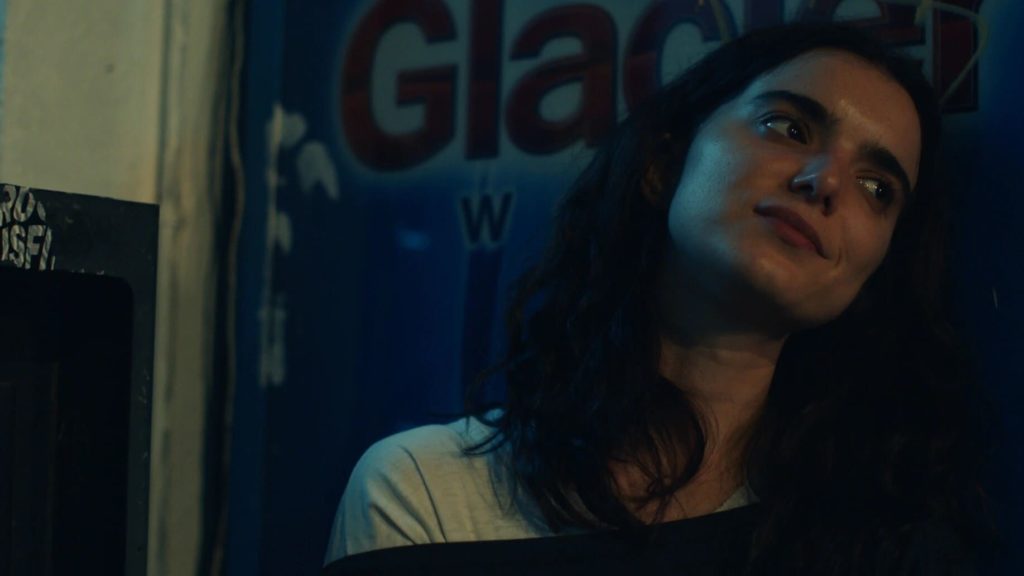For whatever reason, the “college film” has not been as malleable and consistent a format as the “high school film.” In fact “college comedy” is almost a slur; it suggests a substitute of cheap thrills in lieu of good filmmaking. One expects wild parties, hookup mishaps, and imbibing as if there’s no tomorrow. Thankfully, Shithouse is a very different film from your typical college comedy. It is about… wild parties, hookup mishaps, and imbibing as if there’s no tomorrow. Damn it, scratch that argument.
Nonetheless, Shithouse is indeed a very special film. It is one of my favorites of the decade so far. Part of the reason is that it falls into one of my personal favorite filmmaking styles: It is a post-mumblecore film, by which I mean it embraces mumblecore principles of improvised, naturalistic dialogue between middle class young adults with fairly low-stakes, low-structure drama, but was filmed after the mumblecore wave crested in the late aughts/early 2010s. It makes the most of all of those values with incredible cast chemistry and subtle portraiture.
The film is directed by Cooper Raiff, who was 23 at the the time of the film’s release. Raiff also serves as the film’s writer, producer, and editor. As if that weren’t enough, he’s also the star of the film. It is a pretty unbelievable accomplishment, with an even more unbelievable backstory: Raiff was a college student when he made Madeline & Cooper during spring break. He uploaded the student film to YouTube and tweeted the link to Jay Duplass, who then supported him on production of a feature film remake. Less than two years later, Shithouse won the jury prize at SXSW.
You wouldn’t know that this is the work of a novice by watching it. The movie flows smoothly when it needs to, rugged when it needs to. Raiff has patience for great reaction shots — largely of his own face. He has big, expressive eyes and a great look of gentle bewilderment.
Shithouse is a tonally perfect movie, funny and tender but also mean in the right moments. It is not without youthful indulgences (we’ll get to the problematic finale in a moment), but, after seeing it twice, I remain absolutely blown away how assured the film is.

The story is a remixed Before Sunrise: boy and girl connect, spend a long, magical night together that is simultaneously romantic and therapeutic. The pair come out on the other side transformed from the experience, connected in a powerful way. At least, that’s the way Alex (Raiff) sees it. To Maggie (Dylan Gelula), it’s an embarrassing moment of vulnerability from a drunk and lonely night that she’d rather forget. Alex is emotionally intoxicated; Maggie is emotionally hungover. In proper mumblecore fashion, this is not a happy ending kind of film. Nor is this a sad ending kind of film, for that matter. Expect bittersweetness and ambivalence.
There are so many things to love about Shithouse, but my favorite might be Raiff’s vision of radically, uncomfortably soft masculinity. Alex is so “in touch with his feelings” that it is destroying his life at college. He is relentlessly homesick despite going to parties with girls who want to hook up with him. He calls his mom daily and has imaginary conversations with his stuffed animal. All of this is played straight and without denigrating the character into a quivering wimp. In some ways it mimics the “nice guy” trope, but totally fresh. Raiff gives it an edge of self-destructive gentleness and takes away the involuntary celibacy, framing it totally differently.
Raiff and Gelula have terrific on-screen chemistry, and their night about town is pure, huge-hearted delight. (Speaking of the night footage, rookie cinematographer Rachel Klein does an excellent job allowing the scenes shot in the dark to retain a gentle warmth and vividness about them. It’s so inviting to look at.) Had the movie cut off at the hour mark as sunrise approaches, I still would have marked this as a good movie.
But it’s that last act that really elevates the film to something special and shows that Raiff put a lot of thought into what a Before Sunrise meet-cute might look like in the aftermath. It is awkward, as Alex and Maggie have wildly different thoughts on the previous night’s meaning. Raiff pulls no punches, letting Alex’s pitiful, embarrassing attempts at reconnection accumulate, while Maggie grows increasingly distant and inscrutable in response. It sends them on a spiral that culminates in one of the most bracing arguments in recent film history. (It’s not quite Before Midnight level, but few are.) The fight has a terrific, Jennifer Garner-themed punchline.

And then there’s the coda, easily the biggest wart on the film. We get a time jump that essentially validates every problematic trait of Alex’s, as if the movie missed its own point. It really sucks the air out of an otherwise terrific third act. There are some cues that the coda might be imagined by Alex, but not enough to state it concretely; and, even if it is imaginary, it’s an unnecessary beat. We already know what’s going on in Alex’s mind.
(The second biggest flaw of the film is its title. Why Raiff decided to give such a thoughtful film a crude, obtuse name is baffling. I suppose it was a bit of irony, but it’s definitely a miss. The European release title, “Freshman Year,” is more generic but much more accurate.)
I should admit some personal bias that might make me more sympathetic to the film: I had a very rough transition during my freshman year of college like Alex. It was nothing like the liberating bacchanal you typically see in pop culture. My specific impulses and homesickness were not quite the same as Alex’s, but I felt a similar sense of detachment and self-pity. I’ve never seen a film capture this specific feeling, so it was validating to see on screen. Even when Alex was off-putting, I at least empathized with his perspective.
Shithouse is an instant classic, rich and rewatchable. So much of the writing and timing and emotional texture are special. It’s a great debut for Raiff, whose career I will follow closely, even after sophomore effort Cha Cha Real Smooth is not quite so exhilarating and original.
- Review Series: Cooper Raiff
Is It Good?
Exceptionally Good (7/8)
Awards, Honors, & Rankings
- Favorites of the First Half of the 2020s - Selection
- Top 100 Movies (2023 List) - #66
Dan is the founder and head critic of The Goods. Follow Dan on Letterboxd. Join the Discord for updates and discussion.

